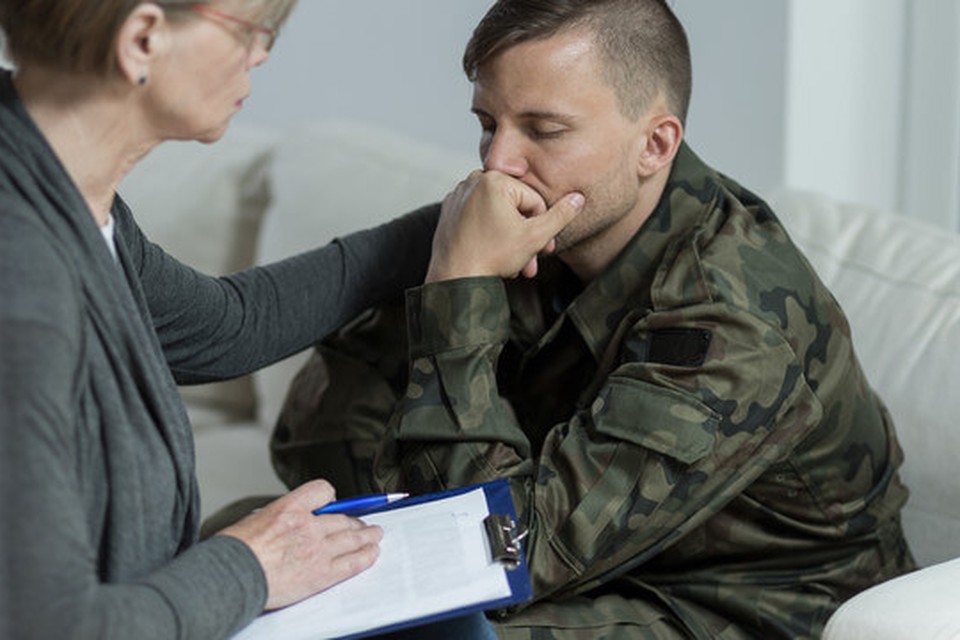Those who choose a life of military service make countless sacrifices on behalf of their country, risking their very well-being to protect the citizenry and promote democratic values. This risk encompasses not only their physical health but also their mental and emotional health. Conditions such as depression, anxiety, and post-traumatic stress disorder (PTSD) are common afflictions for those in active service as well as those who have returned to civilian life.
Individuals who work in the military social work field help ensure that soldiers and veterans receive the resources they need to enjoy healthy, well-adjusted lives. For anyone who is drawn to helping those who have stepped up to serve as a military social worker, earning an advanced degree in social work is an important step toward this rewarding career.
What Does a Military Social Worker Do?
Veterans and active-duty service members turn to military social work professionals for help dealing with issues such as psychological and emotional disorders, child abuse, addiction, domestic violence, and thoughts of suicide. Military social workers provide individual and family counseling, crisis intervention, support for families of active-duty service members, and debriefing after critical events.
Those serving in the U.S. Army, Navy, Air Force, and Marine Corps can receive counseling for psychological disorders such as depression, anxiety, and PTSD. Military social workers today work with individuals to address issues related to their service in World War II, the Vietnam War, the Korean War, the Afghanistan War, the Iraq War, as well as conflicts in Somalia and the Persian Gulf.
Additionally, military social workers develop and implement disease prevention and health promotion programs. They also participate in or lead research into social issues such as predeployment and postdeployment resiliency, comprehensive health care, and transitioning to civilian life. Military social workers assist in the training of medical personnel as well.
Where Do Military Social Workers Find Employment?
Military social workers may work within a variety of organizations and agencies that offer programs focusing on areas such as community mental health services, family advocacy, and alcohol and drug abuse prevention.
They may obtain employment at veterans’ service organizations or military-related agencies. They may also start their own private practice. Service centers located at military bases offer employment to social workers who can provide financial management assistance, relocation support, and services to family members with special needs.
Pursuing a Career in Military Social Work
Those interested in pursuing a career in military social work need to earn a Master of Social Work (MSW) degree to be eligible for licensure and to qualify for most positions. Coursework in MSW programs helps prepare students with the necessary skills and knowledge to practice as a social worker. An education and specialized training will help aspiring military social workers understand the many complexities of the field.
Key Skills for Military Social Work
According to an article published in the Journal of Social Work Education, professionals practicing military social work need to understand:
- Military culture and subcultures
- The life-stage and developmental influences of basic and advanced military training
- The multidimensionality of vulnerability, risk, and resilience associated with military service and deployments
- How premilitary experiences impact military and deployment-related outcomes
- Empirical evidence regarding the behavioral manifestations, comorbidities, and evidence-based treatments for combat-related PTSD compared to PTSD in civilians
- Unique barriers to care related to stigma and potential negative military career implications
- The influence of military indoctrination, socialization, training, and unit cohesion on vulnerability, risk, and resilience
- How physical symptoms and psychiatric diagnoses may affect military career progression, security clearances, military medical reviews, fitness-for-duty evaluations, disability ratings, compensation, and separation from military service
Specialized Training for Military Social Work
After completing an MSW program, U.S. Army social workers receive advanced individual training (AIT) through the Army’s Medical Service Corps. U.S. Navy social workers attend a five-week program at the Officer Development School (ODS) in Rhode Island. Military social workers must possess knowledge of the Council on Social Work Education’s advanced practice behaviors and the National Association of Social Workers’ standards of care.
Military Social Work Salary and Career Outlook
According to Payscale data, the median annual salary for social workers in the U.S. Army is approximately $72,400 as of 2024. Several factors can affect a social worker’s specific salary, including their years of experience and level of education.
According to the U.S. Bureau of Labor Statistics, employment of social workers, including military social workers, is projected to grow 7 percent between 2022 and 2032. This is faster than the average growth projected for all professions, suggesting that the future looks promising for those pursuing social work careers.
Choose a Path in Military Social Work
A career in military social work provides individuals with a meaningful way to help support the well-being of our brave troops and honored veterans, and to address the mental health effects and issues that accompany service.
Those looking to make an impact in this role should consider pursuing an advanced degree. Start your career in military social work by enrolling in the Online Master of Social Work program at Tulane University, which is designed to help students build skills that can transfer into any of a variety of settings.
